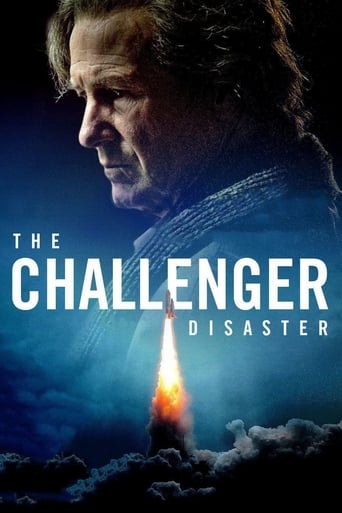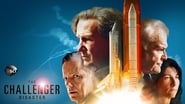eladb573
On the surface, this movie should have been a great one. Here we have a great true story, involving a relentless search for truth, a government agency cover-up, a secret confidential source, and a tragedy that shook the nation. Coupled with a hero in the charismatic, eccentric and brilliant Richard Feynman, this could easily have been as good or better than say "Spotlight", or any other great movie of that genre. Yet, this movie, although OK, somehow misses. It's not great, has no great powerful moments, nor particularly funny or self deprecating. Something to watch when nothing else is on and no more.Some of the blame must go to the portrayal of the main character, on which the entire story revolves - prof. Richard Feynman. One of the greatest physicists in history, with a crazy rich past and eccentricities that are legendary, and he is simply boring! It is clear to me that neither William hurt who plays him, nor the director has bothered to watch any of his many televised lectures ind interviews. First of all - the famous Brooklyn accent. Than the constant cocky smile and sharp humor. The many anecdotes and metaphors that are often his way of explaining. Non of it are present here. If it were up to me Alan Alda would play him as he is both sorta looks like him and is funny, serious and can do a great accent. Also the constant emphasis on his illness is over the top and distracting.About the only really good thing I can attribute to this film is it's uncharacteristic accuracy. I didn't notice any factual errors, and that is rare in Hollywood.In summation, this is a mediocre movie, that with a better cast and writing staff could have been a great one. Too bad!
safarigirlinasia
I stumbled across The Challenger Disaster late last night while watching Discovery. I was drawn into the film because it starts by depicting Feynmann, a legend in the physics world, teaching a class.For those who, like I do, work with physicists on a daily basis, William Hurt's depiction of Feynmann is particularly satisfying because the actor has captured so accurately the unique characteristics of both the man himself and of the profession as a whole. While watching this film, I often found myself nodding in recognition as Hurt showed us the kind of single-minded drive for the truth that can seize hold of a scientist engrossed in an interesting problem. At the same time, the more human side of those with such blazing intellect is also movingly portrayed. In Hurt's Feynmann, I saw the same spirit that my colleagues exhibit every day.The movie is also interesting for its historical aspects. In light of the recent cancelling of the shuttle program by the Obama administration, the revelations of NASA's attempt to justify costs and obtain continued funding by co-opting the Titan rocket program into their own payload have special significance. Likewise, the depiction of the pressurized, risk-accepting not-so-safe safety culture of the time will resonate in this post-Chernobyl, post-Fukushima, post-disaster era, where risk analysis and safety culture is growing in prominence.I was in junior high when the Challenger disaster occurred. I remember the shock and the disbelief, and I also remember how quickly the whole thing was forgotten. But as this movie reminds us, thanks to Dr. Feynmann's brilliant work, and the help of other men and women of integrity who were on the commission, something useful and lasting came out of it.
Prismark10
This is a drama-documentary that has been co produced by the BBC and they managed to attract a star cast with Oscar winner William Hurt playing distinguished scientist Feynman and Bruce Greenwood continuing his mini run of playing nice guys as General Kutyna.The drama is based on the Space Shuttle Challenger disaster of 1986 and the Presidential commission set up to investigate the accident and the various factions some with their own self interest at stake who wanted to hinder the investigation or put it down to human error.The film had to summarise these investigations and sell it to the viewer in an easy to understand way and Feynman is the vehicle who was famous for making science accessible.Hurt portrays the man as dogged but he was also very ill at the time of the investigations. Kutyna gives him clues along the way. Eve Best who plays Sally Ride was rather sidelined, in real life she was more outspoken with the deficiencies of NASA when it comes to safety.It all came down to 'O' rings and how they reacted in sub zero temperatures and the reveal at a press conference was exactly how it happened in real life.A good well acted drama but a little bit too nicely packaged to make it digestible for the viewing audience.
johnmcc150
How times flies when watching a good film! The story is compelling because it is based on real events, though the sets, script and acting also all contributed. The result is not only moving but you get a great insight into the dilemmas and vested interests that can exist at top of government and management. The film is based on the last of Feynman's autobiographical works "What Do You Care What Other People Think?" so it is told from his perspective. The film shows how Feynman was pointed in the right direction. However the story is more complicated. For example there was not time to mention the role of Roger Boisjoly of Morton Thiokol who wrote a damning report about the O-rings six months before the disaster. The report was ignored. He lectured on work-place ethics.William Hurt is physically similar Richard Feynman and did incredibly well with his impersonation. You can see Feynman in action in videos of him lecturing to a lay audience in Auckland and judge for yourself. Feynman died one year and nine months after the publication of the Rogers Commission Report with his appendix, and sadly his wife Gweneth also died the following year.





